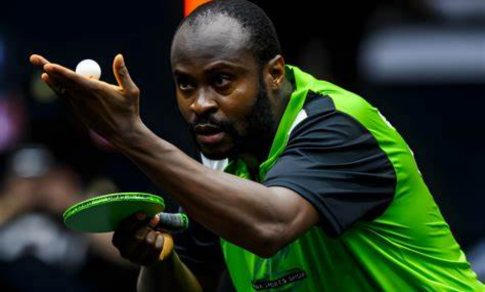Nigeria’s top table tennis player, Quadri Aruna, has found himself in hot water with the World Table Tennis Tournament (WTT) after being fined $5,000 for missing two critical events this year. The missed competitions were the World Team Championships held in February and the prestigious WTT Champions event in March. The fine comes as a significant blow to Aruna, who is one of Africa's brightest stars in the sport, regularly representing Nigeria at the highest level. The WTT’s decision to impose the fine highlights the governing body's strict policies regarding player participation in key tournaments.
Aruna had cited valid reasons for his absence, explaining that he suffered from a severe bout of diarrhoea during the World Team Championships. Additionally, he pointed to club commitments as the reason for missing the WTT Champions event, a common issue for many professional athletes balancing national and club duties. These reasons, however, were not accepted by WTT, which proceeded with the fine, arguing that the Nigerian star's absence was unjustified. The situation has brought to light the delicate balance athletes often face between health, personal commitments, and fulfilling obligations to international tournaments.
In response to the fine, Aruna has taken a proactive approach, seeking a resolution through formal channels. According to reports from *Sportstar*, Aruna has filed an appeal with the International Table Tennis Federation (ITTF) Tribunal, contesting the $5,000 penalty. The appeal process underscores the athlete's belief that his reasons for missing the tournaments were legitimate, and the WTT's actions may have been too harsh. It also demonstrates Aruna’s determination to maintain his reputation and defend his rights as a professional athlete.
The dispute between Aruna and WTT also sheds light on the growing pressure athletes face from multiple fronts. As a player, Aruna is committed to his national team, but he also has obligations to his club, where he earns a significant portion of his income. In many cases, athletes must make difficult decisions when national and club schedules clash, sometimes leading to unfortunate consequences such as fines or suspensions. Aruna's case is a reminder of the complex dynamics at play in professional sports, particularly in less mainstream sports like table tennis.
Aruna's situation has garnered attention across the table tennis community, particularly in Africa, where he is seen as a role model and a pioneer for the sport. Many are watching closely to see how the ITTF Tribunal will handle his appeal and whether they will rule in his favor. The outcome of this case could set a precedent for how similar situations are handled in the future, especially for athletes from nations where financial resources are limited compared to their European or Asian counterparts.
For Aruna, the stakes are high, not only in terms of the financial penalty but also regarding his standing within the sport. His absence from these major tournaments has already raised questions, and the fine adds further scrutiny. Nevertheless, Aruna remains focused on his career, determined to continue representing Nigeria and pushing the boundaries of African table tennis on the global stage. His appeal represents more than just a challenge to the fine; it’s a fight to uphold his integrity and commitment to the sport.
In the coming weeks, as the ITTF Tribunal reviews his case, Aruna will be hoping for a favorable verdict that could overturn the fine and clear his name. Whatever the outcome, the situation has highlighted the need for clearer communication and understanding between athletes and governing bodies, particularly when health and personal commitments interfere with tournament participation. Aruna’s battle with the WTT could serve as a catalyst for broader discussions within the sport about how to better support athletes while ensuring they meet their obligations.








ADD A COMMENT :